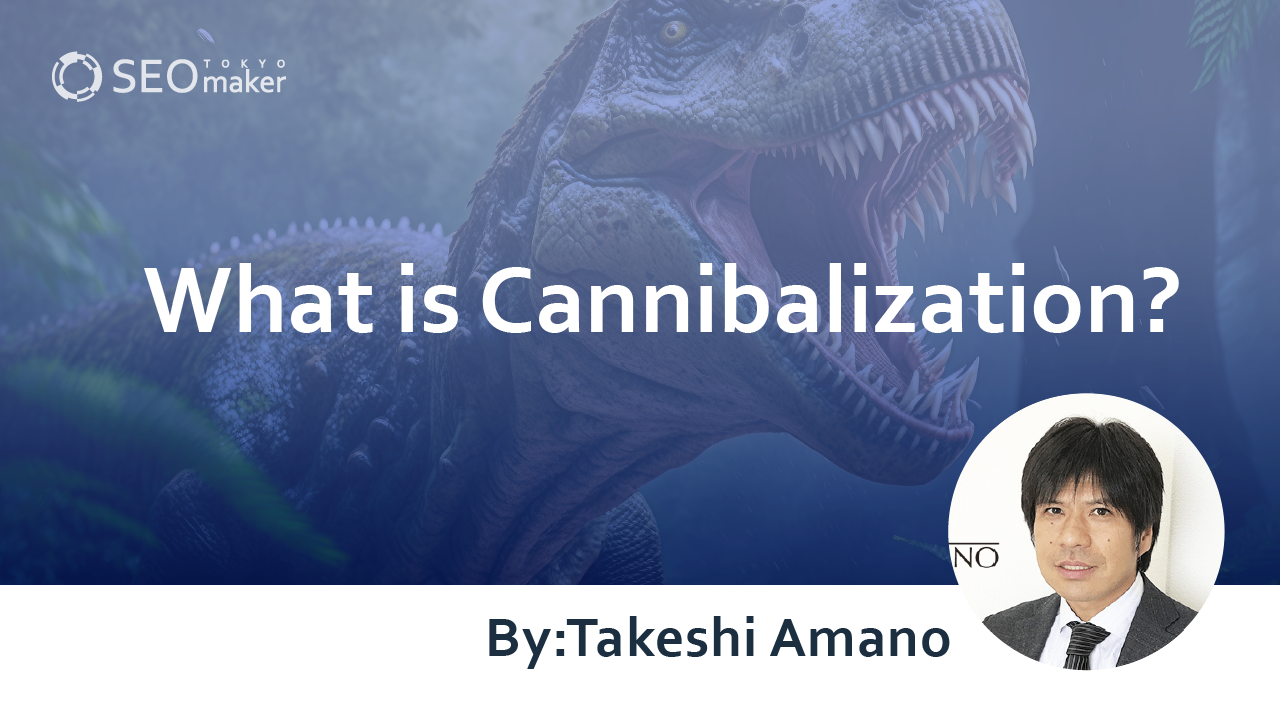What is Cannibalization? : Explaining its Impact on SEO and Strategies for Cannibalization Mitigation
contents
- 1 What is Cannibalization?
- 2 Causes of Keyword Cannibalization
- 2.1 Because there are multiple pages with similar content
- 2.2 Due to the derivation of global content resulting in content duplication
- 2.3 Because content is similar at the keyword selection stage
- 2.4 Because there’s a similarity in terminology and overview explanations
- 2.5 Because the website’s link structure or category relationships are unclear
- 2.6 Because the site itself receives high ratings for search keywords
- 3 The Issues with Cannibalization
- 4 Ways to Identify Cannibalization
- 5 Methods to Prevent and Address Cannibalization
- 6 FAQs on Cannibalization
- 7 Summary

In order to achieve effective SEO for a website, it’s crucial to enhance the site’s value to search algorithms. One of the classic strategies to boost a website’s value is through the proliferation of content pages. Increasing the number of high-quality content pages not only contributes to long-tail SEO but also expands the volume and pattern of keywords that can attract organic traffic.
However, the result of such content proliferation can sometimes backfire in terms of SEO. This is where cannibalization comes into play.
When haphazard content proliferation occurs, it leads to an increase in cannibalization, resulting in a decrease in evaluation by search algorithms. In this discussion, we’ll provide a comprehensive and easy-to-understand explanation of cannibalization, covering its basic concepts, its impact on SEO, and methods for identifying and improving cannibalization issues.
What is Cannibalization?
Cannibalization, a term derived from “cannibal” and “civilization,” signifies “cannibalizing” within various contexts. When it comes to web management, there are primarily two types of cannibalizations that website managers should be aware of.
-Marketing Cannibalization
-Keyword Cannibalization
Let’s delve into each of these aspects.
Cannibalization in Marketing
In the field of marketing, cannibalization refers to a situation where the release of new products by the same producer or brand leads to a decrease in sales of existing products or a reduction in market share.
It’s a scenario where products within the same company compete against each other internally, rather than competing with products from other companies.
Reference: What is Marketing? Explanation of Types and Methods for Efficiency!
Keyword: Cannibalization
Keyword cannibalization occurs when multiple pages within a website compete for the same search keyword. For example, when searching for a particular keyword, multiple pages from one’s own site appear in the search results. This indicates that the pages of the company are competing for search rankings.
Keyword cannibalization also occurs when different pages from the same website appear in search results for the same keyword depending on the timing or context of the search. If only one of Page A or Page B appears in search results for the same keyword at different times, despite both being optimized for that keyword, it can be seen that Page A and Page B are competing for one display slot for that keyword.
Specifically, it is believed that certain keywords are important for search engines and users, and when these keywords are used together with other related keywords or phrases, their relevance and influence increase. This phenomenon attracts attention to specific keywords and makes them more likely to be noticed together.
In the context of SEO, keyword cannibalization can be used as a strategy to improve search engine rankings and increase user access by optimizing websites and content for specific keywords, which then spreads to other related keywords and topics.
Reference: Reasons for Duplicate Content and Remedies
Causes of Keyword Cannibalization
The causes of keyword cannibalization are mainly due to search algorithms assigning similar evaluations to multiple pages of a website for a specific keyword, resulting in them appearing in search results. There are six main reasons why cannibalization occurs on websites
-Multiple pages with similar content exist.
-Content duplication occurs as a result of content derivation.
-Similarity in page content is strengthened by terminology or summary explanations.
-Similarity in content occurs at the keyword selection stage.
-Lack of clarity in the website’s link structure or category relationships.
-The website itself receives high ratings for search keywords.
Let’s explore each of these factors further.
Because there are multiple pages with similar content
When there are several pages that serve as answers to the same search keyword or intent, and these pages have overlapping content, cannibalization is more likely to occur. Within the workflow of a website, cannibalization can happen when multiple clients order similar articles or when the same writer receives a bulk order and ends up reusing content across pages, leading to increased similarity between pages and negative cannibalization.
Reference: How to Outsource Writers for Owned Media? Explanation of Work Scope
Due to the derivation of global content resulting in content duplication
If articles such as “case studies” or “success stories” in a particular field are derived into industry-specific versions, there is a risk of content duplication and cannibalization. For example, creating articles tailored to specific demographics such as age, gender, season, income, or needs, in addition to globally relevant ones, can lead to content duplication and potential cannibalization.
When the search volume for certain keywords is low and there are few competing pages, producing multiple articles tailored to specific targets can increase the likelihood of cannibalization.
Reference: Explanation of How to Investigate Search Volume and Utilize it in SEO Keyword Selection
Because content is similar at the keyword selection stage
When creating articles or pages for SEO purposes, the initial step involves selecting keywords. If, at this stage, selected keywords lead to content that is similar despite being different, cannibalization occurs.
For instance, if separate articles are written for keywords like “Designer Salary Ranking” and “Top-Paying Companies for Designers,” it leads to cannibalization.
Similarly, if titles differ only in words like “recommendation” and “popular” while the rest of the content remains the same, the user’s search intent aligns, causing content and structure similarities and resulting in cannibalization.
Reference: What is the Process of Selecting SEO Keywords? Explanation of Effective SEO Keyword Selection for Successful Web Traffic
Because there’s a similarity in terminology and overview explanations
When the same technical terms or logic summaries are explained from scratch on every page, it increases content similarity and leads to cannibalization.
On owned media platforms aimed at making highly specialized sites understandable to corporate personnel, it’s necessary to explain technical terms in a straightforward manner each time. Especially, if sections unintentionally become similar while trying to make the beginning or first half easily understandable before delving into the core content, cannibalization occurs.
Because the website’s link structure or category relationships are unclear
When there’s a weak relationship between articles within a website in terms of links, and their differences or connections aren’t clearly structured, it becomes difficult for search algorithms to understand the differences and relationships between pages on that website. As a result, multiple web pages without distinct differences may appear in search results for a particular keyword.
Because the site itself receives high ratings for search keywords
Cannibalization is not something that website operators can absolutely prevent by doing specific actions; it arises from the black-box nature of search algorithms. While cannibalization is often perceived negatively, it can also be viewed positively.
Cannibalization occurs when search engines recognize that a specific site provides a lot of content related to a search keyword. It can be seen as evidence that the website is being evaluated as a source of expertise for that keyword.
The Issues with Cannibalization
There are primarily three issues with cannibalization, which arises from conflicts within website search results.
-It negatively affects search rankings.
-It makes it difficult to implement measures for Click-Through Rate (CTR) and Conversion Rate (CV).
-It leads to confusion among users.
I will explain these in detail below.
Negative Impact on Search Rankings
When multiple pages within a website compete for the same keyword, search engines get confused. Ideally, consolidating the evaluations of these dispersed pages into one could potentially lead to a higher search ranking. Since search algorithms are undisclosed, cannibalization may lead to a dispersion of search rankings, making it harder for specific pages to appear higher in search results.
Reference: What is Google’s Algorithm? An explanation of its overview and update history.
Difficulty in Addressing CTR and CV
When cannibalization occurs on pages that affect performance or revenue, addressing click-through rates (CTR) and conversion rates (CV) becomes challenging. In situations where only one page reliably appears for a keyword, improvements to that page can lead to better CTR and CV.
However, with cannibalization, there’s a higher degree of randomness, with rankings flipping between two pages for a keyword or only one page appearing. If a page with high CTR and CV ranks lower or is not displayed, it can lead to lower performance and profits.
Reference: What is Click-Through Rate (CTR) in SEO? Introducing CTR by rankings.
Causing User Confusion
Cannibalization is like having two answers prepared for a user’s search intent. If users can’t distinguish between content, not only in the search-to-click journey but also in site searches or page listings, they’ll become confused.
Ways to Identify Cannibalization
There are primarily three ways to identify cannibalization within a website.
-Find in Google Search Console
-Perform a Google search
-Search in the management panel
I will explain these in detail below.
Identify with Google Search Console
Click on “Performance” in Google Search Console. Enter keywords in the “Search Keywords” section to see a list of web pages related to that keyword. If there are multiple pages with impressions and clicks, it indicates cannibalization.
If clicks are distributed across multiple pages, it shows that access is scattered. When checking with Google Search Console, adjust the “period” to various settings to understand the extent of cannibalization over different periods.
Reference: What is Google Search Console? Explaining how to implement and use Google Search Console.
Perform a Google Search
- Enter “site:siteURL keyword” in Google’s search box and execute the search. For example, for this site, search “site:https://www.switchitmaker2.com/ SEO effects.” This enables searching only within the specified site.
If multiple pages are found, conduct a Google search using the same keyword to check for differences in rankings. This helps understand how close the rankings are and the mutual influence of the pages.
Checking through Dashboard or Site Search
You can also discover keyword cannibalization through WordPress dashboard or site search installed on your own site. This method is useful when you don’t have access to Google Search Console but want to check quickly, perhaps during downtime.
Methods to Prevent and Address Cannibalization
There are mainly five methods to prevent and address cannibalization.
– Hide Low-ranking Pages.
-Merge pages into one.
-Rewrite and change the page to target a different search keyword.
-Add differences and relevance to pages through internal linking.
-Separate and link repetitive content to different pages.
I will explain these in detail below.
Hide Low-ranking Pages
Hide low-ranking pages to avoid confusing search algorithms. When hiding pages, update the sitemap and request page removal through Google Search Console.
Merge Pages into One
Merge content from multiple pages experiencing cannibalization across different sites into one page. Depending on the editing, this can lead to upgraded content, potentially resulting in higher search rankings. Ultimately, merge into the page with the highest search ranking.
Rewrite and Redirect to Pages for Different Search Terms
If two pages are experiencing cannibalization, rewrite the lower-ranking page to target different search needs and aim for higher rankings. Skillful rewriting can make each page independent for its targeted keywords.
Reference: Rewriting Techniques and Procedures – Explaining how to write for SEO benefits
Adding Page Variations and Relevance through Internal Links
This method involves reviewing internal links on both sites and using the content of internal links to differentiate and highlight the relevance of content.
Reference: What are Internal Links? Key points for internal linking to strengthen SEO
Separate and link repetitive content to different pages
This involves isolating sections that are repeatedly explained across multiple pages—such as technical terms, events, or features—into a standalone resource like a glossary. For example, by isolating technical terms in a glossary, you can streamline the explanations, making them more concise. Linking to a dedicated terminology page not only clarifies the content but also reduces textual duplication across pages.
FAQs on Cannibalization
Q: What does ‘Cannibalization’ mean?
A: “Cannibalization” is a term coined by combining “cannibal” and “civilization,” meaning “cannibalism.” In abstract terms, it refers to existing elements within a society or space being influenced by newly emerging or other elements. In a positive sense, it signifies the fusion of newly created elements with existing ones, leading to diverse developments. In a negative sense, it refers to the phenomenon where later-born elements within the same category absorb and eliminate earlier ones.
Q: What is cannibalization in business management?
A: Cannibalization in business management refers to situations where internally generated elements within a business become rivals and influence each other. For example, within a company, approaching the same potential customers through both sales representatives and web advertisements may lead to loss of profit inadvertently. In the business world, the term “cannibalize” is sometimes used as shorthand.
Q: What is Keyword Cannibalization?
A: Keyword cannibalization occurs when multiple pages within a site compete for the same search keyword. For example, when searching for a particular keyword, multiple pages from one’s own site appear in the search results. This indicates that the pages within the site are competing for search rankings.
Q: How to prevent cannibalization?
A: To prevent cannibalization, remove or consolidate multiple pages experiencing cannibalization into one. Another method is to rewrite other pages targeting different search terms, leaving only the highest-ranking page for SEO purposes.
Q: What are some examples of cannibalization?
A: An example of cannibalization is when searching for “DX tools,” two of a company’s pages, such as “List of tools for achieving DX” and “Choosing effective DX support tools by industry,” appear in the search results. Another example is when searching for “DX tools,” either of the aforementioned pages randomly appears, depending on the timing.
Summary
While expanding content pages for specific keywords to aim for SEO effectiveness, cannibalization can naturally occur. Additionally, cannibalization results from Google’s search algorithm responses, and the likelihood of cannibalization increases with Google updates. By carefully implementing measures against cannibalization, improvements can be made not only in search algorithm comprehension but also in creating user-friendly page structures.










![What is a Description? Explaining the Meaning, Writing Style, and Changing Word Count – [2023 Edition]](https://www.switchitmaker2.com/en/wp-content/uploads/2024/09/what-is-description.webp)










